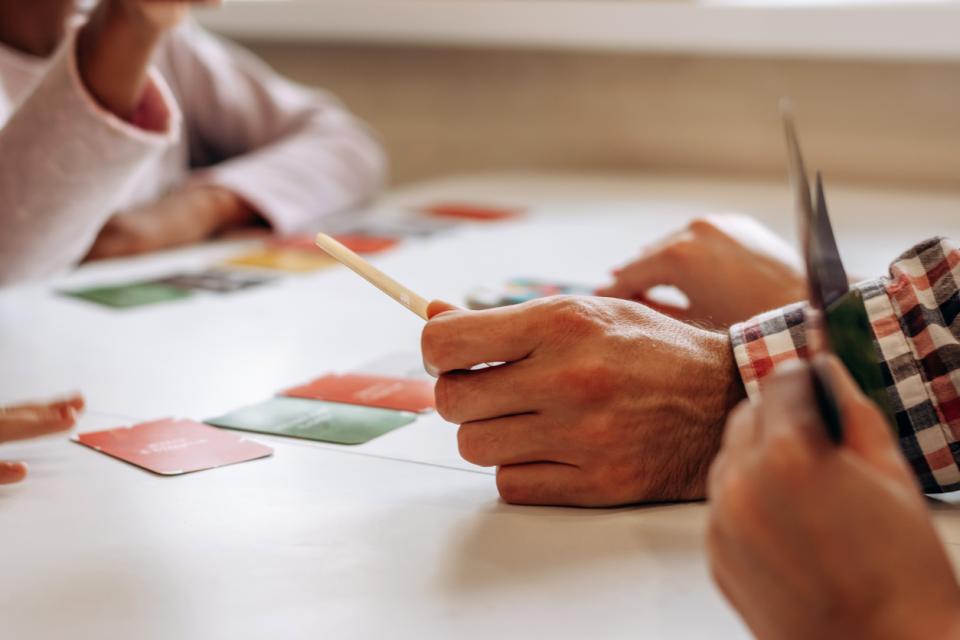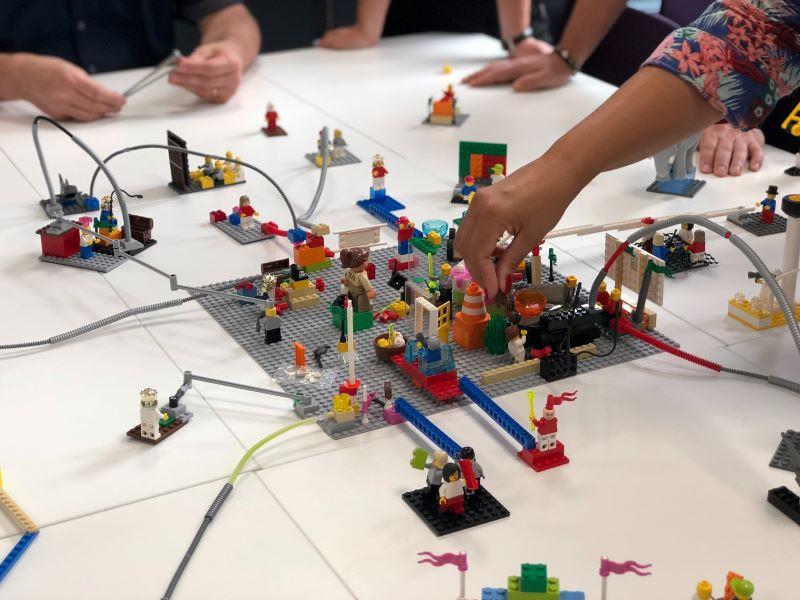Think back to your childhood. You may find that many of your key skills – communication, imagination, information processing – were honed when playing games such as Scrabble, Monopoly or Lego or playing with action figures. The games will vary depending on who you are and where you’ve come from, but one thing stays the same: we all learn through play. When seen through this lens, games are not only for enjoyment but also for developing underlying learning skills. They can provide a playful toolkit that promotes engagement and understanding. You must be in the game to win, so the question is: how can educators start playing?
- Resource collection: Making online learning fun
- Serious play: building knowledge with Lego bricks
- Playful learning: how to get started
We attended a three-day Innoplay Studio course that enhances educators and facilitators’ ability to use playful content to engage learners. Using what we learned, we wanted to integrate our new skills into our academic staff development work and see how our own practices could be enriched to achieve two goals:
- to create inclusive learning spaces where everyone is an active player
- to embrace and encourage interesting and diverse teaching methods.
To help you start your playful journey, we have detailed three levels at which we have successfully used playful learning techniques, which you may wish to emulate in your own practice.
Level 1: Get reacquainted with games
The first step to using play in teaching is to relearn play yourself. This means seeking opportunities to incorporate playful practice where previously “standard” techniques would have been used. Try a name game, for example, alliterating your name with a favourite animal (rather than offering a fact about yourself); incorporate a team quiz to test knowledge retention; or use Lego to build solutions rather than writing a mind map. Look first for opportunities to include play in what you already do, then seek to create playful moments.
This involves experimenting with creating space and time for play and committing to trying new things, even if this results in productive failure. Look for a spare five minutes at lunch, during your next team meeting or halfway through a lecture. Transforming your practice will require playful effort but it can start small.
We saw an opportunity to use play as part of the SDG Teach In, a campaign to put the UN Sustainable Development Goals (SDGs) at the heart of all stages of education and across all disciplines. We created SDG bingo as a way all staff could engage with the SDGs. We set tasks for each SDG in both learning what the goals were and how they could be applied in teaching. We encouraged staff to collaborate in teams and suggested dedicating time for discussion and critical reflection into how the SDGs related to, and could be used in, their practice.
Level 2: Embed play into staff training
Consider the aims of your training and desired outcomes, then choose a game that facilitates this. For instance, the Story Cubes game can be a useful aid for reflection and student support.
We have adapted this game for training doctoral supervisors. Working in pairs, supervisors imagine they are PhD students who have well-being issues. To tell a story about seeking help from their supervisor, they use nine story cubes, each of which have six symbols on their faces. Each supervisor rolls a cube and adds a section to the story.
This game helps meet two aims in supervisor training sessions. First, it provides supervisors with a chance to reflect upon their own practices by finishing each other’s stories. Second, playing the role of a PhD student helps them to understand student perspectives.
Level 3: Introduce games into speeches and lectures
Introducing games and elements of interactive play into a lecture or speech is an effective way to keep an audience – whether colleagues or students – engaged. Make sure the games are designed to deepen understanding of the topics being presented, whether through reflection or application.
When preparing a speech called “Using innovative play in peer support: how to incorporate ‘play’ into learning”, we devised the following activities inspired by Innoplay:
1. Lego constructive icebreaker
Student mentors in the room were given a selection of Lego pieces, from which they had to build structure(s) to represent their university and peer-support experiences. They then shared their ideas and constructions in small groups to facilitate discussion.
2. Online storytelling activity
Attendees had to create a short story in three minutes and share it on Mentimeter. The story could follow any direction, however, it had to feature the three objects they would take to a desert island, which they had selected at the start of the talk. This is in keeping with the spirit of Story Cubes. By sharing their stories, all participants, both online and in-person, felt actively included in the event.
In feedback, attendees said they had been inspired to consider how to embed more play in their own practice.
End of the game?
Unlike most real games, ours have no endpoint; we will continue looking for and finding ways to embed playful practice. The ideas above are simply the opening moves on our chessboard. We are drafting examples to share with colleagues and encourage them to start their playful journeys.
Not sure where to start? Consider yourself the dungeon master, the game organiser who is so crucial in Dungeons & Dragons – your students are key players and each has different skills. Your job is to enhance these skills, levelling up for each new theme, technique and ability that they learn.
So, what are you waiting for? Let’s play.
Eleanor Cook is transformative education assistant, Emma Norman is academic skills and student engagement officer and Tian Yan is academic developer at the University of Exeter.
If you found this interesting and want advice and insight from academics and university staff delivered direct to your inbox each week, sign up for the Campus newsletter.




comment